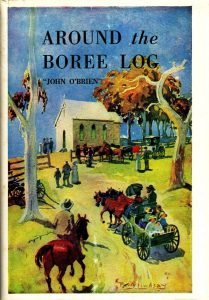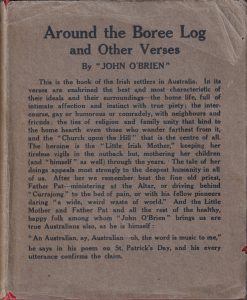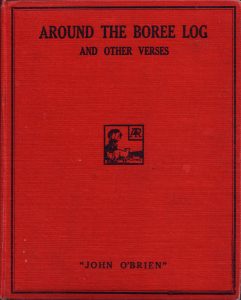[Editor: This book of poetry, written by “John O’Brien” (Patrick Hartigan), was published in 1921. As there are many older words and phrases in his poems, including quite a few of Irish origin, which may be unfamiliar to many readers, a glossary has been provided.]
Around The Boree Log and Other Verses
By John O’Brien

Around the Boree Log
Oh, stick me in the old caboose this night of wind and rain
Calling To Me
Through the hush of my heart in the spell of its dreaming
The Little Irish Mother
Have you seen the tidy cottage in the straggling, dusty street,
One By One
With trust in God and her good man
Ten Little Steps and Stairs
There were ten little Steps and Stairs,
The Trimmin’s on the Rosary
Ah, the memories that find me now my hair is turning gray,

She saw The Helper standing near
The Old Bush School
’Tis a queer, old battered landmark that belongs to other years;
Six Brown Boxer Hats
The hawker with his tilted cart pulled up beside the fence,
The Libel
“The flowers, have no scent, and the birds have no song,”
When the Circus Came to Town
When the circus came to town
His Father
We meet him first in frills immersed,
The Kookaburras
Fall the shadows on the gullies, fades the purple from the mountain;

Do you ever dream you hear it, you who went the lonely track?
The Church upon the Hill
A simple thing of knotted pine
Currajong
Old Father Pat! They’ll tell you still with mingled love and pride
The Helping Hand
When that hour comes when I shall sit alone,
Vale, Father Pat
Yes, that’s the hardest hand at all upon my frosted head —
Josephine
The presbytery has gone to pot since this house-keeper came;
The Old Mass Shandrydan
I can see it in my dreaming o’er a gap of thirty years,
Pitchin’ at the Church
On the Sunday morning mustered,
Said Hanrahan
“We’ll all be rooned,” said Hanrahan
The Tidy Little Body
Faith, and little Miss McCroddie was the tidy little body
The Pillar of the Church
Faith, ’tis good to see him comin’ when the bell for Mass is flingin’
Teddo Wells, Deceased
Times I think I’m not the man —
Norah O’Neill
That Norah O’Neill is a sthreel,
The Presbyt’ry Dog
Now of all the old sinners in mischief immersed,
Tangmalangaloo
The bishop sat in lordly state and purple cap sublime,
The Altar-Boy
Now McEvoy was altar-boy
At Casey’s After Mass
There’s a weather-beaten sign-post where the track turns towards the west,
St. Patrick’s Day
’Tis the greatest splash of sunshine right through all my retrospection
The Carey’s
Their new house stood just off the road,
When Old Man Carey Died
A night of wind and driving rain
The Parting Rosary
They have brought the news, my darlin’, that I’ve waited for so long
Ownerless
He comes when the gullies are wrapped in the gloaming
Laughing Mary
With cheeks that paled the rosy morn
Moryah
“Wisha, where is he goin’ to now
A Stranger in the Church
’Twas Callagan who jerked the thumb —
Tell Me, What’s a Girl to do?
Tell me, what’s a girl to do
The Wiree’s Song
The Wiree sang that Christmas Day,
Wisha, What is the Matter with Jim?
“Wisha, what is the matter with Jim, I dunno?
Said the White-Haired Priest
Said the white-haired priest, “So the boy has come
Honeymooning from the Country
To the rooms where I am dining in the glaring city’s day
Making Home
No, you don’t quite get the meaning when the fun is at its height
Could I Hear the Kookaburras Once Again
May a fading fancy hover round a gladness that is over?
Come, Sing Australian Songs to Me!
Come, Little One, and sing to me
Published in:
John O’Brien, Around the Boree Log and Other Verses, Sydney: Angus & Robertson, 1921
The text on the front cover (dust jacket) of the 1921 edition is as follows:
Around the Boree Log
and Other VersesBy “John O’Brien”
This is the book of the Irish settlers in Australia. In its verses are enshrined the best and most characteristic of their ideals and their surroundings — the home life, full of intimate affection and instinct with true piety; the intercourse, gay or humorous or comradely, with neighbours and friends; the ties of religion. and family unity that bind to the home hearth even those who wander farthest from it, and the “Church upon the Hill” that is. the centre of all. The heroine is the “Little Irish Mother,” keeping her tireless vigils in the outback hut, mothering her children (and “himself” as well) through the years. The tale of her doings appeals most strongly to the deepest humanity in all of us. After her we remember best the fine old priest, Father Pat — ministering at the Altar, or driving behind “Currajong” to the bed of pain, or with his fellow pioneers daring “a wide, weird waste of world.” And the Little Mother and Father Pat and all the rest of the healthy, happy folk among whom John O’Brien brings us are true Australians also, as he is himself:
“An Australian, ay, Australian — oh, the word is music to me,”
he says in his poem on St. Patrick’s Day, and his every utterance confirms the claim.
I read the Boree Log recently and couldn’t help think that it was about a person who had known/ cherished marriage and a family, yet the writer was an unmarried Catholic Priest. Could it be that ‘John’ carried a fond memory of a lady he had hoped to marry, or is it a story about one or more of the many folk he knew?